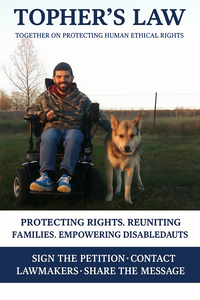"Subject: Support Topher’s Law: Reuniting Families & Protecting Disabled Adults
I'm Twila Foley, and I’m advocating for a new Missouri law—Topher’s Law—to protect the rights of adult individuals with disabilities who are under guardianship.
Too many families are torn apart because a guardian can restrict access to a loved one—even when the adult ward wants to see their family.
Topher’s Law would:
Guarantee that adult wards can visit with their immediate family if they consent
Require guardians to petition the court (not families) if they want to block access
Provide a court-appointed advocate to speak for the ward—at no cost
Protect against isolation and empower the ward’s voice
No one should have to fight in court just to see their child, sibling, or parent—especially when the person under guardianship wants those visits to happen.
I need your help.
Sign and share this petition.
Contact your legislators and ask them to support Topher’s Law
Help me spread the word: families belong together
Let’s protect rights, dignity, and love. Let’s pass Topher’s Law.
With gratitude,
Twila Foley
[email protected]"Topher’s Law: Legislative Draft
Topher’s Law
Together on Protecting Human Ethical Rights
A Proposed Bill for the State of Missouri
Author: Twila Foley
Article I – Purpose
To affirm the rights of adult disabled individuals under guardianship in Missouri by prioritizing their autonomy, family connections, and access to justice. This law ensures that guardianship does not equate to isolation, and that family access cannot be denied without due process.
Article II – Bill of Rights for the Ward
The Right to Family: The ward has the right to maintain relationships and spend time with immediate family members, including outings and visits, without requiring prior court, or guardian approval, so long as the ward knowingly consents.
The Right to Consent: The ward has the right to freely consent to or decline visits, phone calls, and outings with family or others, and to have that consent respected.
The Right to Be Heard: The ward has the right to express their wishes in any court proceeding related to visitation or guardianship restrictions.
The Right to Representation: The ward shall be appointed a guardian ad litem or attorney ad litem, at no cost, to represent their expressed interests when visitation is challenged or restricted.
The Right to Non-Retaliation: The ward shall not be punished, isolated, or otherwise retaliated against for maintaining relationships with family members or for asserting their rights under this law.
The Right to Due Process: The guardian must petition the court and present evidence to restrict access by immediate family. The court shall prioritize the ward’s voice and well-being in any decision.
Article III – Definitions
1. “Immediate Family” shall include:
Biological or adoptive parents
Children (biological or adopted)
Siblings (including half- and step-siblings)
Grandparents
Legal guardians prior to the current guardianship
Any person who has acted in a parental capacity for the ward (may be considered with supporting evidence and court recognition)
2. “Consent” means:
Voluntary agreement to phone calls, visits, or outing, expressed verbally, in writing, or through alternative communication methods that the ward uses regularly and understands.
3. “Guardian ad litem” or “Attorney ad litem”:
A neutral individual appointed by the court to represent the expressed preferences and rights of the ward, not the general “best interest” unless the ward is legally incapable of expressing such wishes.
Article IV – Procedural Guidelines
Access Presumption: Immediate family members may visit, and/or take the ward on outings, and/or call without prior court, or guardians permission if the ward consents.
Guardian’s Petition to Deny Access:
The guardian must file a petition to restrict or deny access, and/or communication, citing specific and articulable reasons with supporting evidence.
The ward’s consent to visits, outings, and calls shall be given priority unless the court finds that such consent cannot be meaningfully given.
Court Timelines: All petitions to restrict access must be heard within 15 days, and emergency temporary orders may not exceed 3 days without a full hearing.
Review and Accountability: Any guardian found to be unjustly restricting access or retaliating against the ward may be subject to review, sanctions, or removal.
Article V – Short Title
This Act shall be known as Topher’s Law: Together on Protecting Human Ethical Rights.
"

